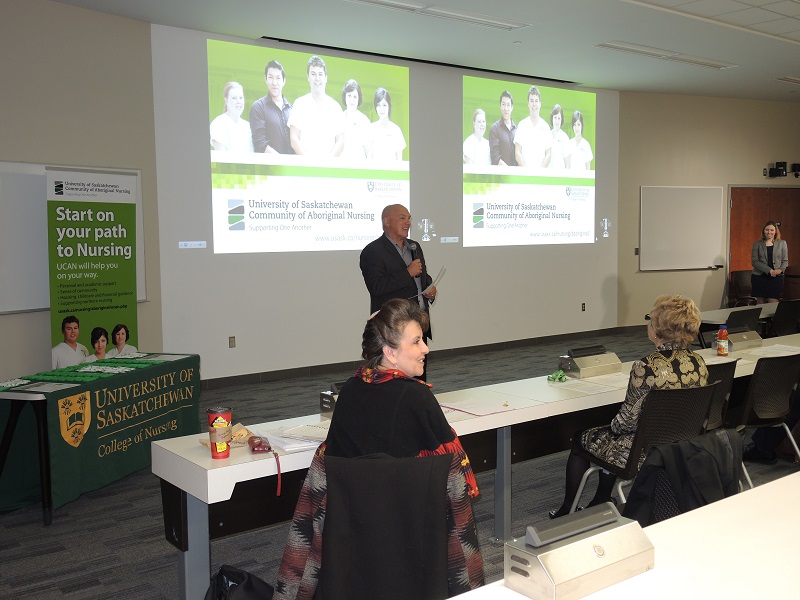
The Official Launch of UCAN
The University of Saskatchewan (U of S) College of Nursing created the country’s first Aboriginal nursing program, the Native Access Program to Nursing (NAPN), in 1985, when there were only 35 Aboriginal baccalaureate-prepared nurses in Canada.
NAPN continued to be the most successful program in the country for recruiting Aboriginal nursing students, with 29% of all Canadian Aboriginal nursing students studying in Saskatchewan according to the most recent Canadian Association of Schools of Nursing (CASN) survey.
When the College of Nursing moved from the previous undergraduate program model to the current indirect entry Bachelor of Science in Nursing (BSN) program in 2012, it was time to re-examine the NAPN program and its name. Welcome UCAN – the University of Saskatchewan Community of Aboriginal Nursing. The core of UCAN has been and will continue to be student support and advising. Aboriginal nursing advisors located in Saskatoon, Regina and Prince Albert will work with students at all sites to build community, provide advisement and support.
But the College of Nursing has decided to go one step further and provide a pathway for Aboriginal students helping them transition from high school, into University and ultimately into the workforce. Specifically, the College will offer services aimed at getting Aboriginal students through the high school science requirements and pre-professional year of Arts and Science, UCAN advisors will then support students while studying nursing at the U of S and by offering a mentorship program in partnership with the Aboriginal Nurses Association of Canada the College aims to see successful nursing students become successful Registered Nurses as they transition to the workforce.
“We’ve never had a problem attracting Aboriginal students to nursing,” said College of Nursing Dean Lorna Butler. “Where we’ve had challenges, is in getting them successfully through the door with some of the tougher prerequisite courses. We’re now putting more resources into science and math success at the K-12 level, including easy access to bursaries for tutorial support in high school chemistry and math for rural Aboriginal students.”
“We know how important it is for Saskatchewan’s health care system to be representative of the people it serves. UCAN will position us to get to where we need to be as a province, by offering Aboriginal students a pathway into the College of Nursing and then out into the health care workforce.”
On March 13th, the College of Nursing officially launched UCAN and the pathway program with a celebration at the Saskatoon Campus. Guest speakers at the launch included Dr. Gordon Barnhart, Interim President of the University of Saskatchewan and Dr. Lisa Bourque-Bearskin, President of the Aboriginal Nurses Association of Canada. 2nd year Saskatoon Campus student Alana Ross was also on hand to receive the UCAN Celebration Bursary, a one-time $1,500 bursary awarded to six students across the province (Phyllis Probert – Ile-a-a-la-Crosse, Joanna Lariviere – La Ronge, Chantelle Paul – Prince Albert, Rene Lerat – Regina and Jessica Funk – Yorkton). The College of Nursing will continue to celebrate the launch of UCAN with province-wide events at our Yorkton, Regina, Prince Albert and northern sites throughout March and April.
In addition to the UCAN celebration, the Saskatchewan Institute’s Director, Roger Francis, was also on hand to announce the publication of a new Conference Board of Canada report co-authored by College of Nursing Dean Dr. Lorna Butler and Strategist for Outreach and Indigenous Engagement, Dr. Heather Exner-Pirot. Healthy Foundations: Nursing’s Role in Building Strong Aboriginal Communities assesses the current status of the Aboriginal Registered Nurse workforce in Canada, articulates the social and economic benefits that Aboriginal Registered Nurses provide and documents how new technologies enables the College of Nursing to offer a distributed undergraduate nursing program in the communities of La Ronge and Île-à-la-Crosse in Northern Saskatchewan.

